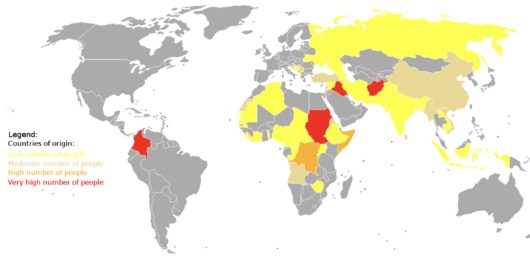Why do we still have refugees? As critical as is this question, a thoughtful inquiry begins with still deeper questions: why do we still have war, poverty, or social injustice? One week each month, I am the emergency physician for a small Missouri town. Almost every patient is compelled to come to my ER suffer from the physical consequences of some failure within society or human character. Similarly, international refugees are almost always flee to another nation because of profound social or human failures.
This world map indicates the countries of origin of today’s international refugees. The greatest numbers are fleeing from the nations in red color: Afghanistan, Syria, Sudan, and Colombia, followed nations in gold color by Yemen and Congo. Why do these nations create refugees? We must begin with deeper questions. Why are these nations replete with war, poverty, social injustice – or simultaneously all three?
Imagine yourself being a citizen in one of these nations, responsible for a young family. How would you respond to conditions that cause your loved ones hunger, cold, physical violence, false imprisonment, or utter destitution? You, like these 70 million others, would likely leave your home behind and attempt a perilous journey to a better locale.
Durable solutions to the cause of international refugees lie in mitigating conditions which force families from their homes. Space here does not permit a suitable analysis of war, poverty, or social injustice. But the corruption underlying them all is blatant disregard for the value of human life.
This 2022 Winter Term I am teaching the INMED International Refugee Care Course, a graduate-level course that earns 2 of academic credit hours towards the Master’s Degree in International Health (MIH). In this context, learners will equip themselves for the phases of international refugee care and thus provide significant aid to these, our worlds most vulnerable citizens. And together we, as caring human beings, will also confront the deeper question, why do we still have refugees?

